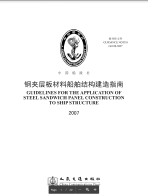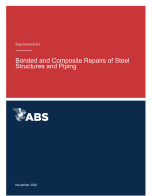Cold Work Solutions For Offshore Repair Safety Assured, Quality Guaranteed
Permanent cold work repair for offshore and maritime structures with Sandwich Plate System (SPS) technology.

An Authorised Installer of SPS Technology Cold Work Solutions
Approved by Majority of IACS Societies





Approved by Majority of IACS Societies
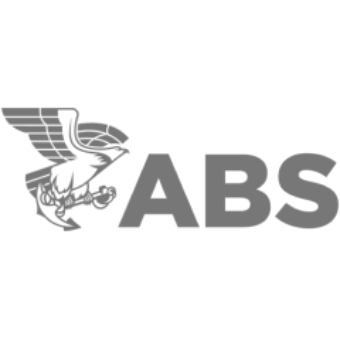
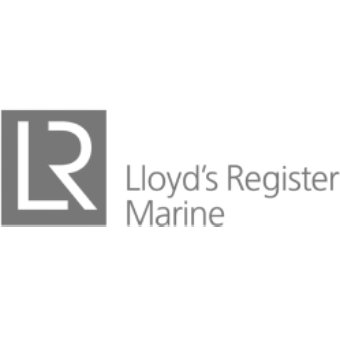



About SPS Technology Cold Work Solutions
Requires up to 90% less labour and 56% less steel than crop and renew technique.
Up to 11x less expensive and 3x faster than traditional steel crop and renewal.
Used in over 500 projects covering 300,000m of various marine and offshore repair.
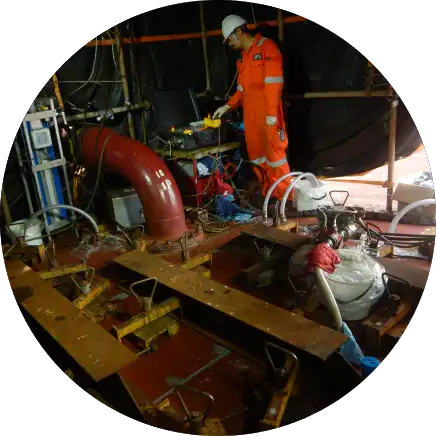
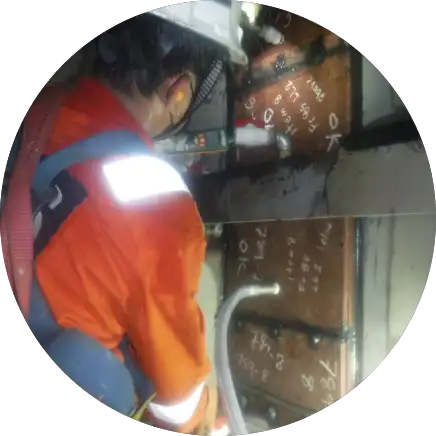
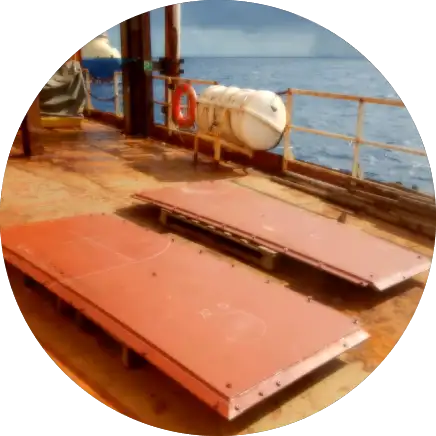
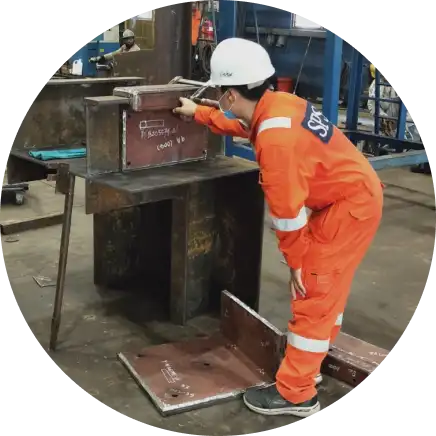
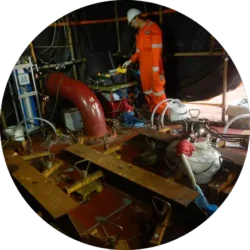
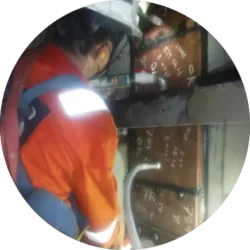
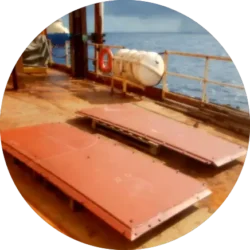
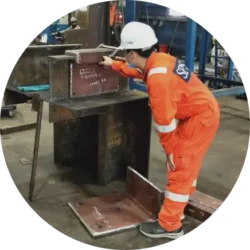
Requires up to 90% less labour and 56% less steel than crop and renew technique.
Up to 11x less expensive and 3x faster than traditional steel crop and renewal.
Used in over 500 projects covering 300,000m of various marine and offshore applications.
About Us

Mission
To provide cold repair technology and solution, cost-effective, safe and uncompromised quality services.
Vision
To become Asia’s top solution provider for structural integrity in Marine and Offshore Industry.
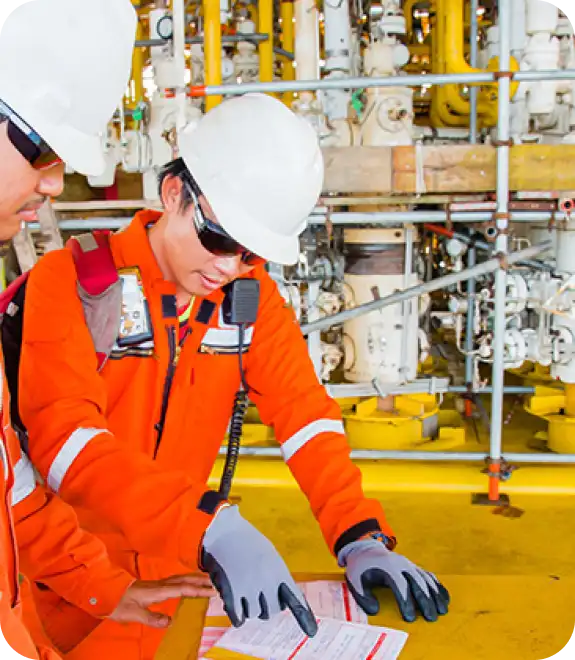
Mission
To provide cold repair technology and ship repair solution, cost-effective, safe and uncompromised quality services.
Vision
To become Asia’s top structural reinforcement solution provider for structural integrity in Marine and Offshore Industry.
Trusted Ship Repair Solution Provider
At MOG Technologies, we focus on providing trustworthy offshore repair cold work solutions that stand the test of time.
As a proven product, MOG Technologies has chosen Sandwich Plate System technology as a key ship repair solution to offer robust cold repair and accelerate growth for offshore and maritime businesses.
Our trusted partners

Sandwich Plate System Technology

PTT Exploration and Production Public Company Limited

Pan Mechanic Engineering Co. Ltd
Why choose MOG Technologies as a Ship Repair Solution?

Ensure greater safety through cold work solutions
Hot works eliminated. Drastically improving safety on ships and offshore assets especially storage, production, transportation of flammable cargo, and materials.

Save time
Pre-welded materials, fast delivery, and onboard installation reduces downtime and assures quick completion.

Cost savings
Fixed costs for materials and installation mean transparent pricing and no hidden fees.
Less Personnel Onboard and Shorter Schedule with Sandwich Plate System

4 weeks

6 weeks
Fabrication of materials onshore via pre-welding and chemical injection preparation. Logistics are then delivered to vessels or offshore structures.

2 weeks
Surface preparation and installation followed by Sandwich Plate System installation, chemical injection, and quality assurance by certified technicians from MOG Technologies.
Popular Coldwork Applications
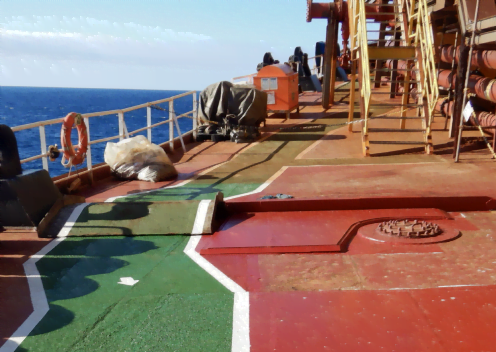
FPSO Main Deck
Reinstatement
Main deck in way of crude oil tank was corroded beyond class limit.
Using SPS technology, deck reinstatement was conducted with 57% less manpower in a 40% faster installation time compared to traditional crop and renewal processes.

FPSO Main Deck Reinstatement
Main deck in way of crude oil tank was corroded beyond class limit.
Using Sandwich Plate System technology, deck reinstatement was conducted with 57% less manpower in a 40% faster installation time compared to traditional crop and renewal processes.
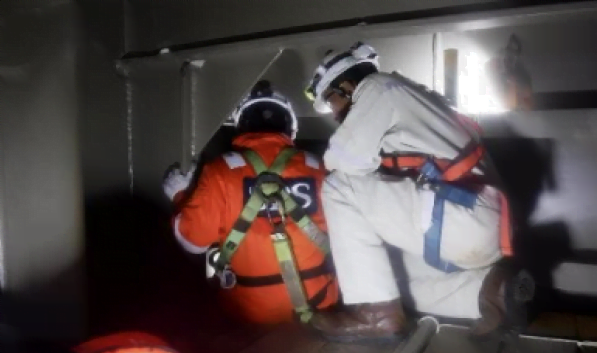
Bulkhead Plate, Shell Plates, Web and Longitudinal Ship Repair
The traditional ship repair would require hotwork, diver and cofferdam.
With cold repair, there was no need for any hot work in tank, cutting through of bulkheads and side shell hull and time-costly leakage tests, saving the FSO precious man hours, giving them a reliable yet competitive service.
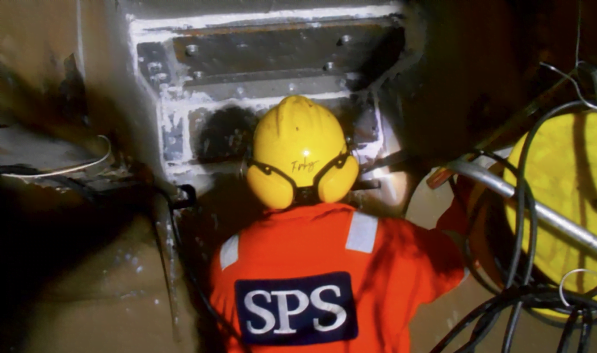
Bottom Plate and Tank Top Plate Ship Repair
A Floating Production Storage and Offloading (FPSO) vessel, required tank top reinstatement work within the inner bottom of a cargo oil tank.
As a result, FPSO experienced zero downtime, and avoided massive opportunity costs as the crude oil tank would need to be cleaned and production would be stopped.
Frequently Asked Questions on Sandwich Plate System Technology
1. What are Sandwich Plate System Processes?
Step 1 – Surface Preparation
The surfaces of new and existing plate, that form the internal SPS cavity, are treated to remove paint and rust and to provide the required surface roughness and cleanliness. This provides the required surface finish for the elastomer to bond effectively when injected. Grit blasting is a reliable method of providing the required surface preparation. Slurry or high pressure water jet may be acceptable, depending on the application, to be agreed.
Step 2 – Fitting of Perimeter Bars
Flat bars of thickness equal to the nominal elastomer core thickness are fitted to create boundaries for the injection cavities. These are welded or adhered to the existing structure. In some cases, the bars may be fitted before blasting the surface of the existing plating.
Step 3 Fitting the Top Plate
Top plates are positioned and welded to the perimeter bars following a thorough QA check, along with any required fittings; such as foundations, pad eyes and lashing pots/sockets.
Step 4 Injection of Elastomer
Mixing and injection of elastomer is carried out under controlled conditions. This may be undertaken by various methods and equipment (impingement mixing, shear mixing, ‘hand mix’) depending on the quantity of material to be dispensed and location of the repair.
- Is SPS a permanent solution approved by classification society
- Yes. SPS is a permanent solution approved by all major IACS societies.
- Yes. SPS is a permanent solution approved by all major IACS societies.
- Is SPS similar like doublers?
- No. SPS is totally different with doubler. Doublers do not strengthen the corroded plating but SPS does.
- No. SPS is totally different with doubler. Doublers do not strengthen the corroded plating but SPS does.
- Can SPS be done without hotwork
- Yes, majority of SPS application for oil and gas environment is done without involvement of hotwork
- Yes, majority of SPS application for oil and gas environment is done without involvement of hotwork
- What is lead time required for SPS
- Generally, is between 6 to 8 weeks upon confirmations.
- Generally, is between 6 to 8 weeks upon confirmations.
- What the information required for SPS?
Generally, SPS will require inspection report like Ultrasonic thickness measurement and structural drawing of the area to be repair
- Does SPS do engineering and class approval on behalf of clients?
- Yes. This is usually done by SPS Technology Ltd
- Yes. This is usually done by SPS Technology Ltd
- Is SPS a patented solution?
- Yes. SPS is a patented solution engineered by its partner BASF.
- Yes. SPS is a patented solution engineered by its partner BASF.
- What is the design life of SPS?
- SPS usually designed up to the end of the vessel’s life.
- SPS usually designed up to the end of the vessel’s life.
- How long SPS established in market?
- SPS is established in 1999. It has more than 20 years in the market.
- SPS is established in 1999. It has more than 20 years in the market.
- What ambient temperature allowed for SPS Application?
- Generally, it is between 5 deg C to 45 deg C.
- Generally, it is between 5 deg C to 45 deg C.
- Can SPS applied on Crude Oil Tank?
- Yes. SPS has been approved by Classification Societies in crude oil tank application.
- Yes. SPS has been approved by Classification Societies in crude oil tank application.
- What standard required for surface preparations?
- Steel surface of the existing plating to be grit blasted to remove the existing paint and surface rust, and to provide an angular profile with a minimum surface roughness of Rz 60+ microns and cleanliness to Swedish Standard SA2.5 (SSPC 10)
- Steel surface of the existing plating to be grit blasted to remove the existing paint and surface rust, and to provide an angular profile with a minimum surface roughness of Rz 60+ microns and cleanliness to Swedish Standard SA2.5 (SSPC 10)
- What is the density of elastomer core?
- 1,100 kg per meter cube.
- 1,100 kg per meter cube.
- What is the thickness of SPS core and top plates?
- Elastomer core is between 15 to 30 mm depending on applications. To plates thickness varies from 4 mm to 10 mm.
- Elastomer core is between 15 to 30 mm depending on applications. To plates thickness varies from 4 mm to 10 mm.
- Can SPS applied under water?
- No. SPS elastomer is water sensitive. The surface cannot exposed to water during application. After it is cured 45 minutes later, it will be fine.
- No. SPS elastomer is water sensitive. The surface cannot exposed to water during application. After it is cured 45 minutes later, it will be fine.
- How long it will take for an injection?
- SPS elastomer injections generally takes less than 12 minutes in a single cavity.
2. Is Sandwich Plate System technology a permanent ship repair solution approved by classification society?
Yes. Sandwich Plate System technology is a permanent ship repair solution approved by all major IACS societies.
3. Is Sandwich Plate System similar to doublers?
No. Sandwich Plate System is totally different with doubler. Doublers do not strengthen the corroded plating but Sandwich Plate System does.
4. Can Sandwich Plate System be done without hotwork?
Yes, majority of Sandwich Plate System application for oil and gas environment is done without involvement of hotwork
5. What are the information required for Sandwich Plate System?
Generally, Sandwich Plate System will require inspection report like Ultrasonic thickness measurement and structural drawing of the area to conduct cold repair
Contact Us






